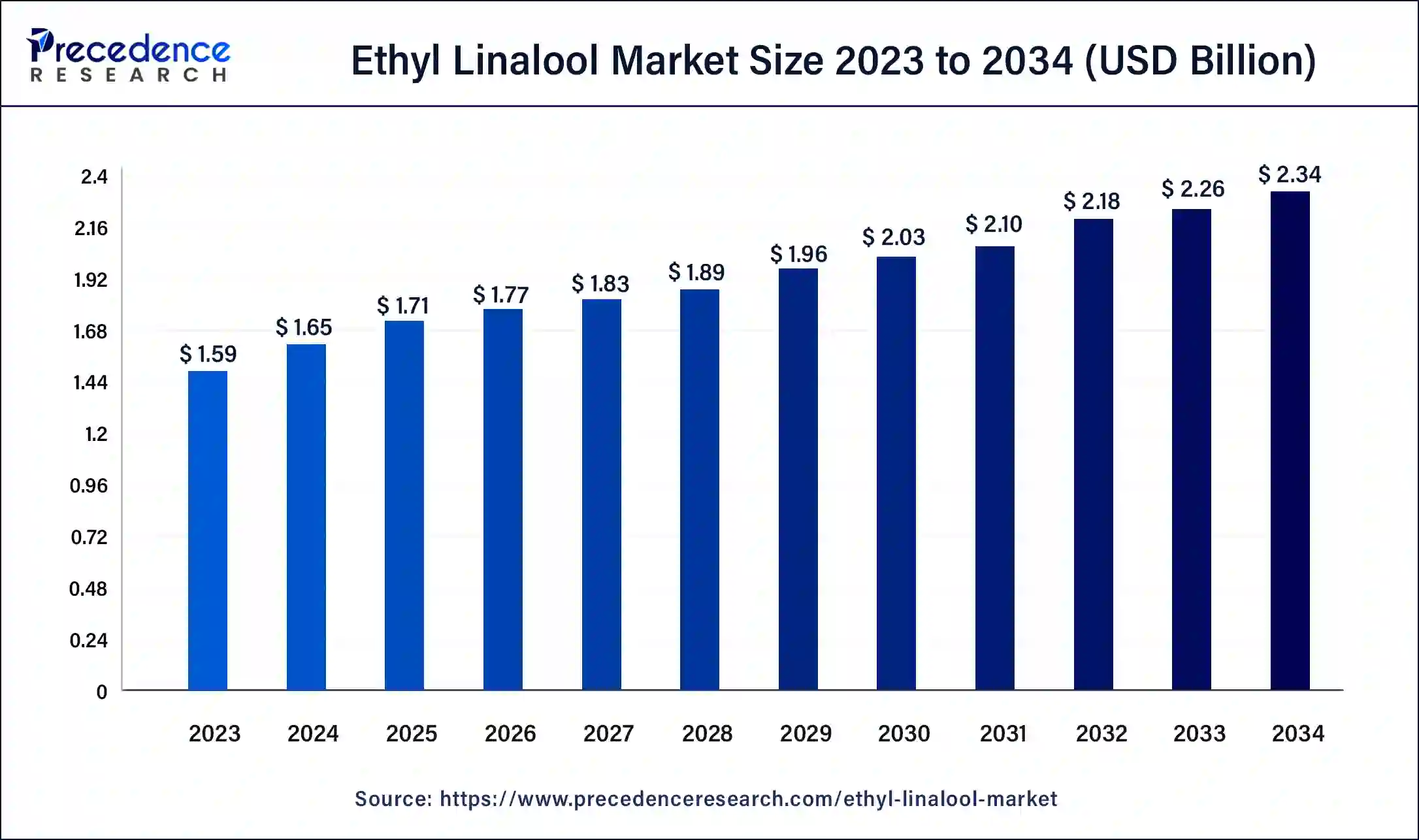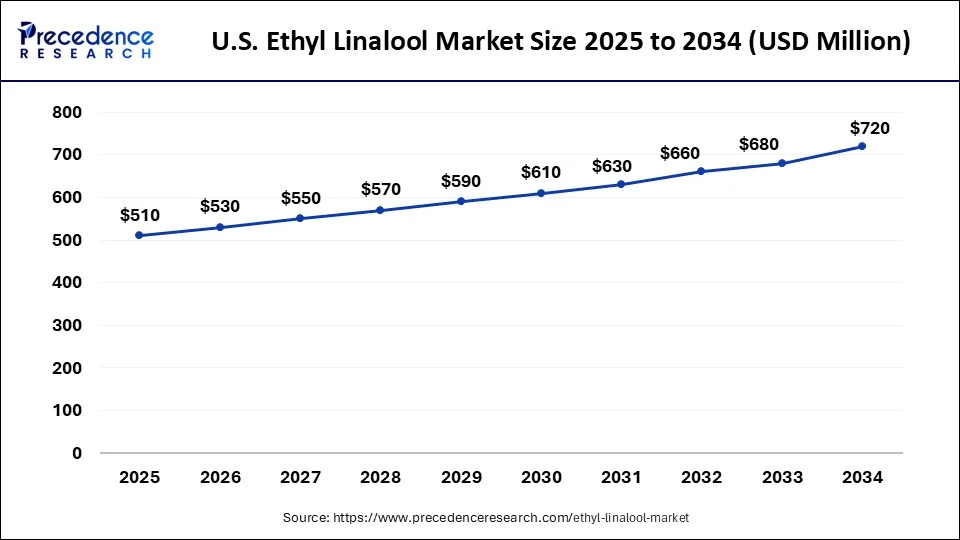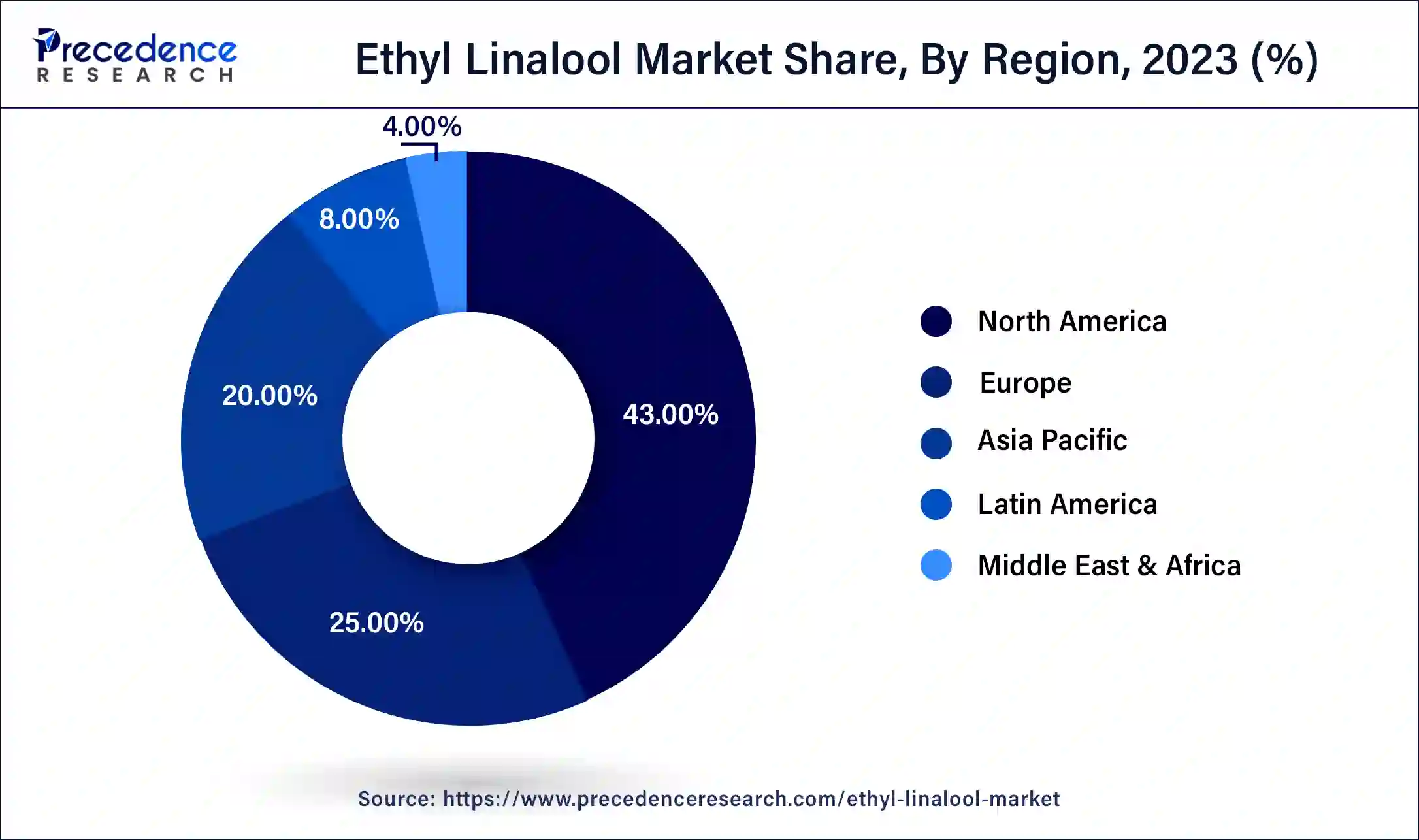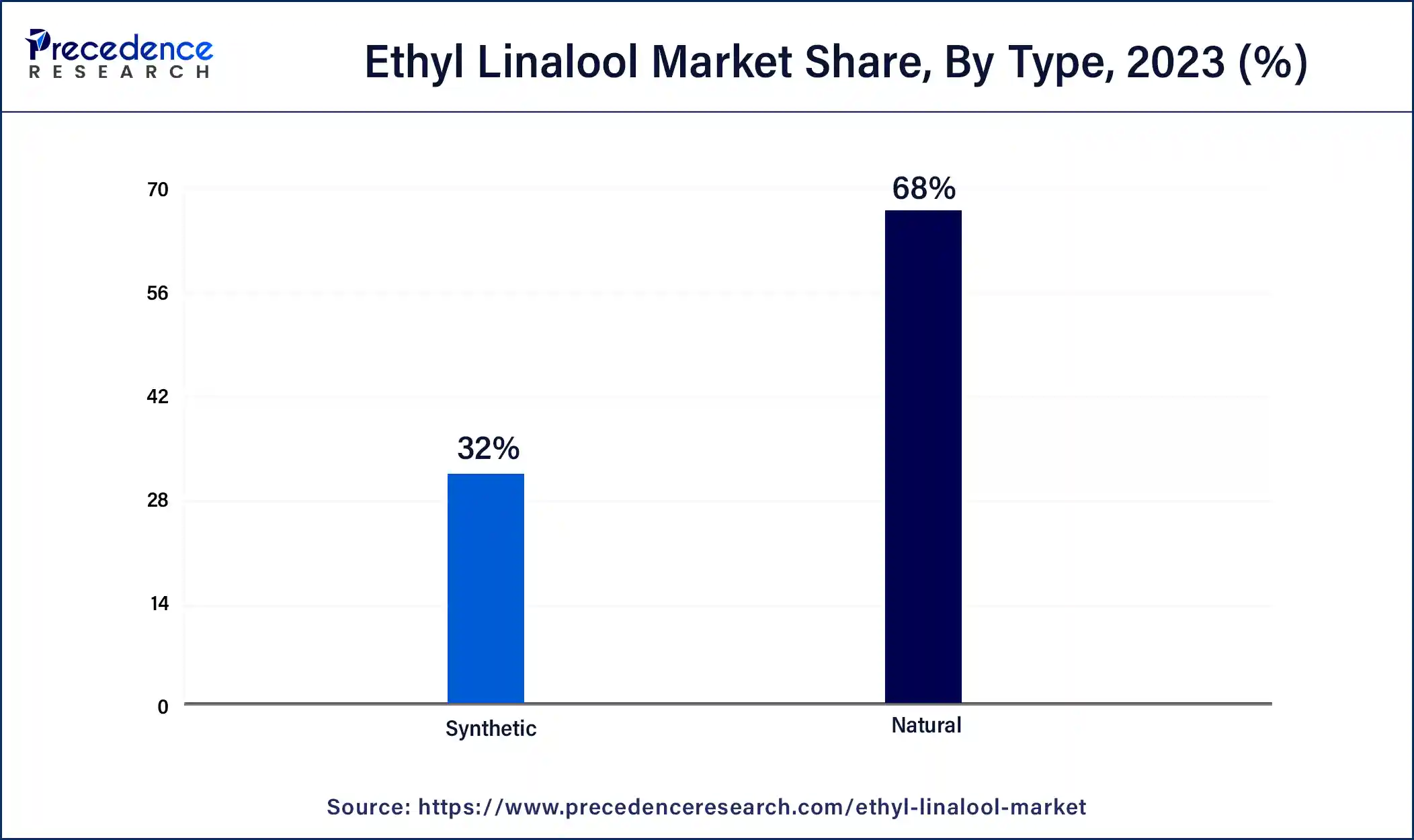January 2025
The global ethyl linalool market size was USD 1.59 billion in 2023, calculated at USD 1.65 billion in 2024 and is expected to be worth around USD 2.34 billion by 2034. The market is slated to expand at 3.56% CAGR from 2024 to 2034.
The global ethyl linalool market size is expected to be worth USD 1.65 billion in 2024 and is anticipated to reach around USD 2.34 billion by 2034, growing at a CAGR of 3.56% over the forecast period 2024 to 2034. The North America ethyl linalool market size reached USD 680 million in 2023. The global demand for the Ethyl Linalool market is increasing because of the increasing use of natural and environmentally friendly additives in fragrances, cosmetics, and the food industry.

The U.S. ethyl linalool market size was exhibited at USD 480 million in 2023 and is projected to be worth around USD 720 million by 2034, poised to grow at a CAGR of 3.75% from 2024 to 2034.

North America dominated the global ethyl linalool market in 2023. The technological advancement, developed industries, high-quality healthcare systems, and increasing customer awareness of personal care items. The major players within this region continue to emphasize research and development and the production of new and differentiated products. Concerns for sustainable and natural products are trendy among consumers, which will increase demands for both the fragrance and cosmetics markets. Thus, with increasing investment in research and development, the region will have a robust distribution network and effective marketing strategies to drive the market.

Asia Pacific is anticipated to grow at the fastest rate in the ethyl linalool market during the forecast period. Rapid urbanization, industrialization, increasing disposable incomes, and increasing access to healthcare in regions including China, Japan, and India. The rise in the usage of personal care and cosmetic products along with a preference toward natural and organic products. The product adaptation, affiliation, and enormous investment in research and innovation.
Ethyl Linalool is a synthetic compound and is a colorless to slightly yellow liquid, with a floral, fresh slightly woody fragrance. Some of its applications include use in personal care products, cosmetics, laundry care, and certain home care products. The Ethyl Linalool market products has been progressively growing due to the constant interest in its use as a fragrance and in personal care. The global market has been driven by factors such as increasing demand for natural products.
Applications of Ethyl Linalool
| Perfume industry | Ethyl Linalool is used in perfumes to create floral notes of bergamot, rose, and lavender. |
| Personal care | Used as a perfume in products such as body showers, wash, soap, synthetic cleansing |
| Laundry care | Ethyl Linalool is used in laundry care products such as detergent powder, liquid detergent, and fabric softener. |
| Home care | Ethyl Linalool is used in home care products such as candles, pot pours, and incense. |
| Aromatherapy | Ethyl Linalool is used in aromatherapy to promote relaxation, reduce stress, and improve sleep. |
| Food and beverage industry | Ethyl Linalool is a synthetic aroma ingredient used as a flavoring agent in the food and beverage industry. |
| Report Coverage | Details |
| Market Size by 2034 | USD 2.34 Billion |
| Market Size in 2024 | USD 1.65 Billion |
| Market Growth Rate from 2024 to 2034 | CAGR of 3.56% |
| Largest Market | North America |
| Base Year | 2023 |
| Forecast Period | 2024 to 2034 |
| Segments Covered | Type, Molecular Structure, Distribution Channel, Application, End-user Industry, and Regions |
| Regions Covered | North America, Europe, Asia-Pacific, Latin America and Middle East & Africa |
Rising applications in the cosmetics industry
The growth in sales of cosmetics and personal care products and personal grooming habits are the factors that are driving the ethyl linalool market. Ethyl linalool is a synthetic aromatic aldehyde used in fragrance mixtures at room temperature it has floral lavender and sweet fragrance. It is used as a scent in perfumed hygiene products such as body showers, wash, soap, synthetic cleansing, cleansing bars, baby, hand, bath, and toilet soaps, shampoos, and lotions.
Ethyl linalool serves the purpose of enhancing the fragrance of skin, hair, and body care products and is also a stabilizing agent. It does not irritate and is ideal for use in formulations intended for sensitive skin, thus adding to the versatility of the ingredient for use in a variety of cosmetic products.
Growing aromatherapy applications
The growth of aromatherapy applications is fueling the growth of the Ethyl Linalool market. Ethyl linalool is a pure natural fragrance material that has floral, fresh, mild sweetness; it is employed in the perfumery industry with flower ingredients. It does not smell as 'woody' as linalool and has a longer drying time, making it ideal for use in oils, shampoos, and other perfumery applications. Essential oils are used in aromatherapy. It is the use of natural scents for healing purposes. Aromatherapy is an approach that is employed to improve the psychological health and bodily health of a human being.
Raw material price volatility
Ethyl linalool is a raw material used in the fragrance, flavor, and aroma, chemical, pharmaceutical, soap, and detergent industries. It's also used in perfumery to create floral-fresh notes of rose, bergamot, and lavender. Fluctuations in raw material prices are a significant restraint on the ethyl linalool market, affecting the manufacturing cost and profitability. The price varies due to factors such as climate change, manufacturer, and geopolitical factors.
Rising awareness towards natural products
The demand for natural fragrances is continuously increasing, strongly based on the health benefits and long-lasting fragrances offered by natural fragrances as compared to synthetic fragrances. Natural perfume is a perfume that has ingredients that are naturally derived, while synthetic perfume is made of artificial molecules. Natural components are things like plant notes, flowers and flower oils, resins, woods, and other materials and substances obtained from plants and animals. Natural fragrances do not have synthetic fragrances or toxic chemical compounds. They are also made using ethically sourced ingredients, so they don't harm the environment.
The natural segment contributed the biggest share of the Ethyl Linalool market in 2023. A natural perfume is a fragrance made up of natural ingredients, as opposed to synthetic perfumes created from artificial molecules. Natural ingredients in perfumes can be plant aroma also other elements and substances of natural origin. Natural fragrance products are gradually gaining the market due to the health benefits attributed to these products as compared to synthetic fragrances.

The synthetic segment is predicted to grow significantly in the Ethyl Linalool market over the forecast period. Synthetic fragrances can be used in various products, such as perfumes, deodorants, and cleaning detergents. Synthetic materials tend to be uniform in quality, and they have better and longer-lasting scents that are more intense. They can also be standardized perfumes that will always smell the same and will remain effective for a certain time on the skin.
The (R)-Linalool segment dominated the global ethyl linalool market in 2023. Consumers are gravitating towards natural ingredients, which has led to increased demand for R-linalool, as it is a naturally derived compound. This trend is further driving its popularity in cosmetics, household cleaners, and aromatherapy products. Studies have shown that R-linalool has calming and anti-inflammatory properties, which has made it a popular choice in wellness products, such as essential oils and aromatherapy treatments.
The perfumery cosmetics segment dominated the global ethyl linalool market in 2023. Ethyl Linalool is floral, fresh bergamot with a certain sweetness. Ethyl Linalool has applications in the cosmetic industry, especially as a top-note fragrance for perfumes and in fresh green floral accords. It is compatible with most product formulations, soaps, and more specific areas of applications. Currently, ethyl linalool is slowly being incorporated into fragrances because it is natural and can easily be incorporated into eco-friendly formulations.
The online retail segment dominated the ethyl linalool market in 2023. Internet retail stores operate 24/7, and the owners make money whenever offline stores are closed. The new opportunities of the Internet can allow consumers from different parts of the world to buy products and services from online retailers and increase the profits of the brands. Online retail provides the consumer with an easy way of browsing the store and purchasing products.
The direct sales segment is expected to grow with the highest CAGR in the Ethyl Linalool market during the forecast period. Direct relationship building with the customers leads to a better understanding of their needs and preferences. Greater control over the sales process, pricing, and distribution channels. Selling directly to consumers ensures that the quality of product, packaging, and pricing are up to standard.
The cosmetics segment held the largest share of the global Ethyl Linalool market in 2023. Ethyl Linalool components are widely used in cosmetics products. It can be used in alcoholic perfumes, antiperspirants, deodorants, creams, lotions, lipstick, talcum powders, tablet soap, liquid soap and shampoos, and hair conditioners. The demand for Ethyl Linalool in cosmetics is driven by its pleasant floral fragrance and its use as a natural fragrance ingredient. Furthermore, the increase in consumption of beauty products and skincare products has led to this growth, thus placing Ethyl Linalool at the center of the developing cosmetics industry.
Segments Covered in this Report
By Type
By Distribution Channel
By Application
By End-user Industry
By Geography
For inquiries regarding discounts, bulk purchases, or customization requests, please contact us at sales@precedenceresearch.com
No cookie-cutter, only authentic analysis – take the 1st step to become a Precedence Research client
January 2025
August 2024